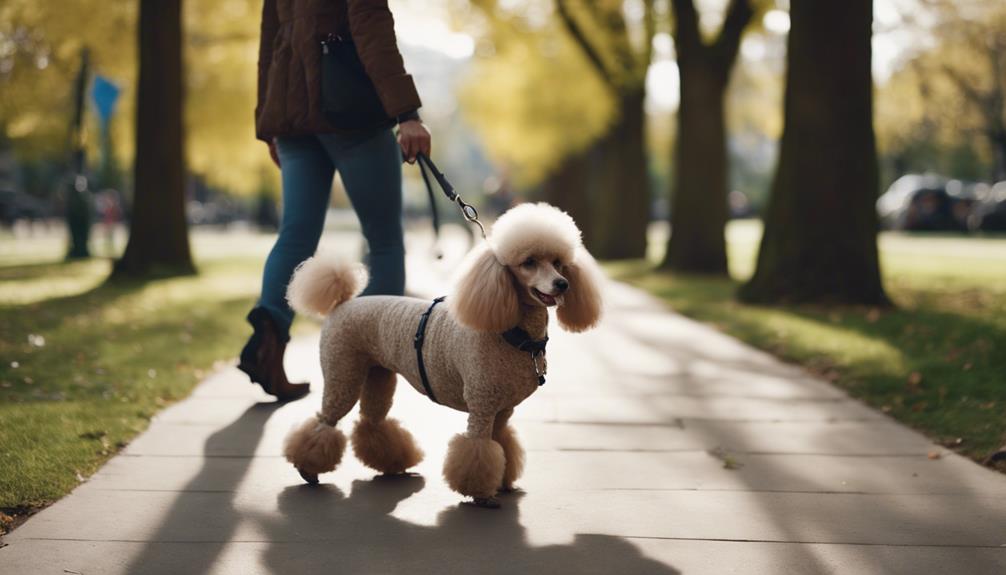If you've ever felt like mastering the art of leash training your poodle is an insurmountable task, fret not. There are effective techniques that can transform your walks from chaotic to calm in no time. By understanding the basics of positive reinforcement and consistent cues, you can pave the way for a harmonious walking experience with your furry friend. But what happens when your poodle encounters unexpected distractions or struggles with leash manners? Stay tuned to discover how to navigate these challenges and set your poodle up for leash training success.
Key Takeaways
- Start leash training in a familiar environment with high-value treats
- Use positive reinforcement techniques to reinforce desired behavior
- Address common challenges like pulling and distractions during walks
- Ensure safety, gradual exposure, and consistency for effective leash training
Benefits of Leash Training for Poodles
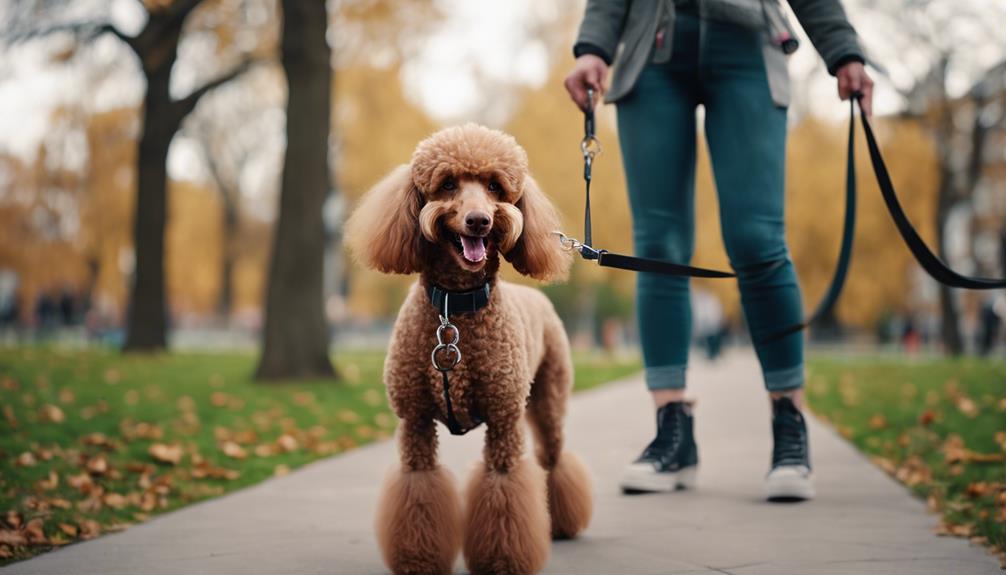
Leash training for Poodles significantly enhances safety during walks and reinforces good behavior, establishing crucial boundaries and strengthening the bond between you and your furry companion. When you train your dog to walk on a leash, you are not only ensuring their safety by preventing potential accidents, but you are also setting clear expectations for their behavior. Through training, your Poodle learns to walk beside you calmly, without pulling or wandering off, making your walks more enjoyable and stress-free. This positive reinforcement of good behavior creates a strong bond between you and your dog, enhancing your relationship and communication.
Choosing the Right Leash and Collar
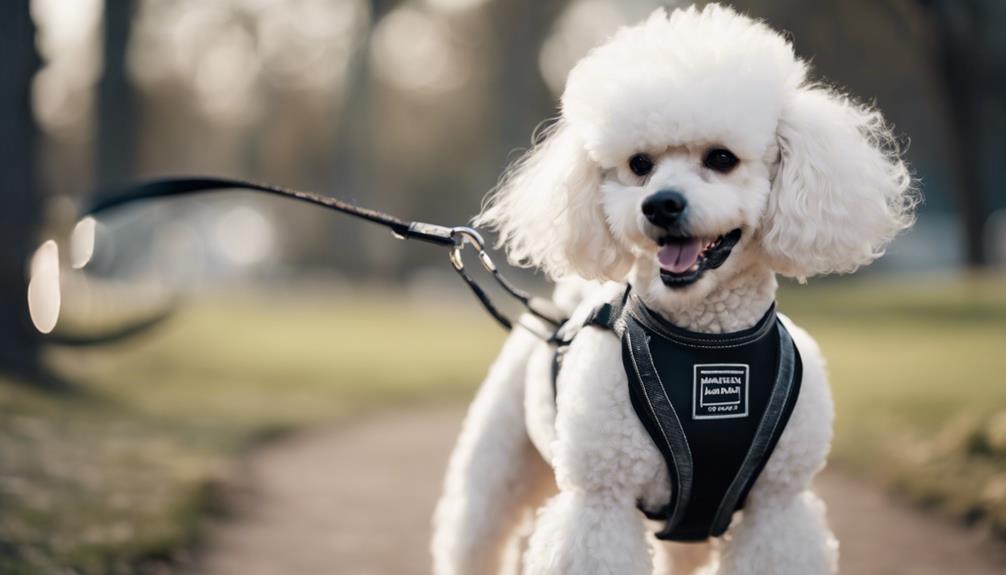
When selecting a leash and collar for your Poodle, the right choices can make all the difference. Consider the leash material and collar size as crucial factors in your decision-making process. These elements play a significant role in your dog's comfort and training success.
Leash Material Guide
Consider your Poodle's size and strength when selecting the ideal material for their leash and collar. When choosing the right leash and collar material, opt for lightweight yet durable options like nylon or leather for comfortable walks. Reflective leashes offer increased visibility during low light conditions, enhancing safety. To ensure your Poodle's comfort and safety during walks, here are three essential factors to consider:
- Material: Opt for lightweight and durable materials like nylon or leather.
- Visibility: Choose reflective leashes for enhanced visibility in low light conditions.
- Comfort: Select adjustable collars for a customized fit to prevent slipping or discomfort.
Collar Size Tips
To ensure a proper fit for your Poodle's collar, accurately measure their neck circumference before selecting the ideal size. When choosing a collar, opt for one that fits snugly but allows two fingers to fit comfortably between the collar and your Poodle's neck. Adjustable collars are a great option for puppies, providing room for growth, while custom-made collars offer a perfect fit. Consider materials like nylon, leather, or fabric based on your Poodle's comfort and durability needs. Remember to regularly check and adjust the collar size as your Poodle grows to ensure a secure and comfortable fit.
| Collar Size Tips | ||
|---|---|---|
| Step | Instructions | Considerations |
| 1. | Measure neck circumference accurately. | Snug fit allowing two fingers. |
| 2. | Choose adjustable collars for growth. | Custom-made for a perfect fit. |
| 3. | Select materials based on comfort. | Nylon, leather, or fabric. |
| 4. | Regularly check and adjust size. | Ensures secure and comfy fit. |
Establishing a Positive Walking Routine
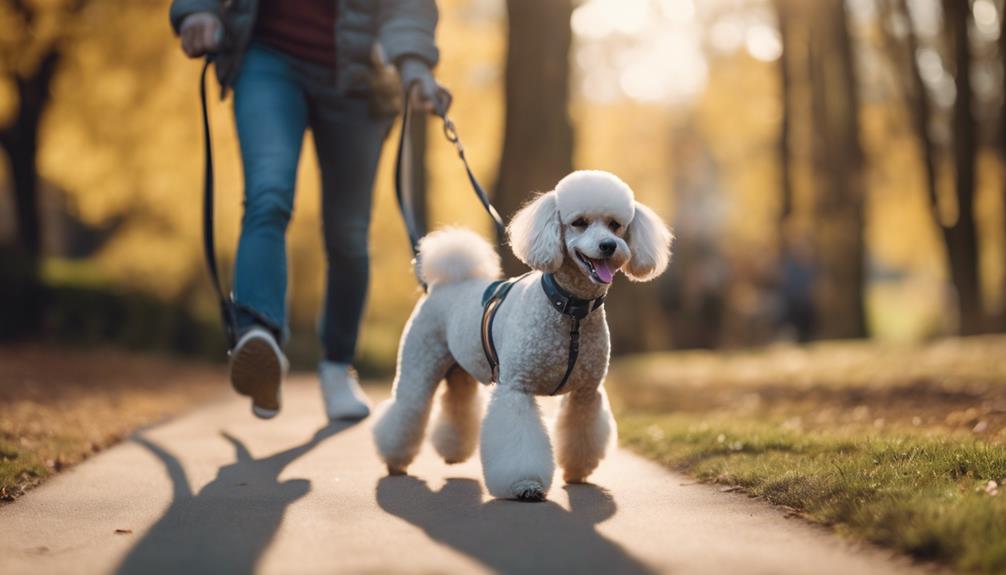
To establish a positive walking routine with your Poodle, focus on using high-value treats and practicing consistency in your training sessions. Here are some tips to help you keep your dog walking politely on a leash:
- Start in a familiar environment: Begin your leash training in a quiet and familiar setting to minimize distractions and help your Poodle build confidence in walking on a leash.
- Use high-value treats: Motivate your Poodle during training sessions by using high-value treats as rewards for good behavior. This positive reinforcement will encourage your dog to walk nicely on the leash.
- Practice consistency: Walk in different directions and reward your Poodle for staying by your side. Consistency is key to establishing a positive walking routine, so be patient and maintain a regular training schedule to reinforce good leash walking habits.
Incorporating Positive Reinforcement Techniques
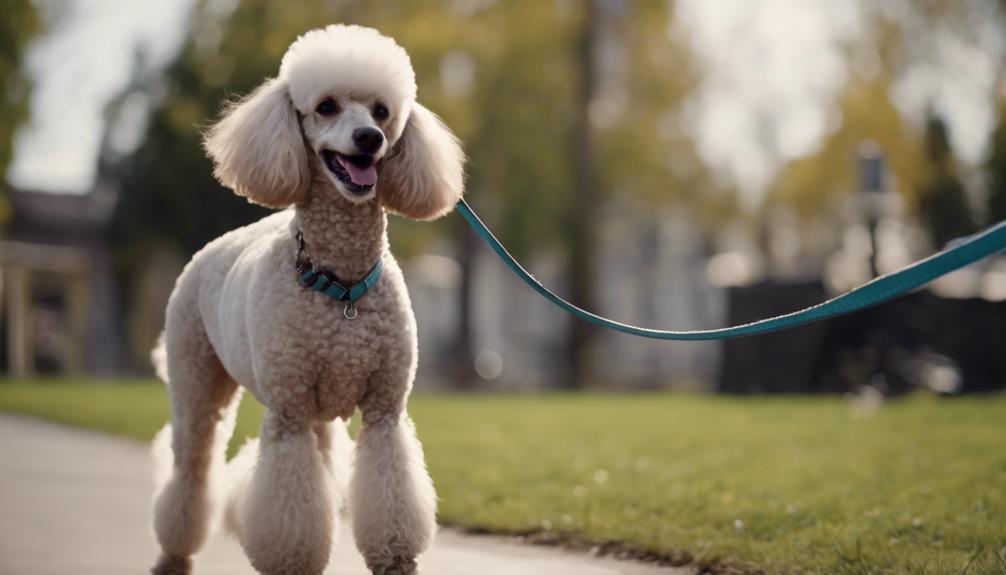
When training your Poodle on leash, incorporating positive reinforcement techniques through the use of high-value treats and consistent rewards can significantly enhance their learning experience. Positive reinforcement involves rewarding desired behaviors like walking calmly on a leash with treats, praise, or toys to encourage your Poodle during leash training sessions. Consistency is key in reinforcing positive leash walking habits – always reward good behavior and ignore unwanted behavior to help your Poodle understand what is expected of them. Additionally, using a cue word like 'heel' when your Poodle is walking nicely on the leash can help them associate the behavior with the command. Remember to keep training sessions fun and engaging by incorporating play breaks and interactive moments to further reinforce positive behaviors.
| Positive Reinforcement Techniques |
|---|
| Reward desired behaviors with treats, praise, or toys |
| Use high-value treats like small pieces of chicken or cheese |
| Be consistent in rewarding good behavior and ignoring unwanted behavior |
Addressing Common Leash Training Challenges
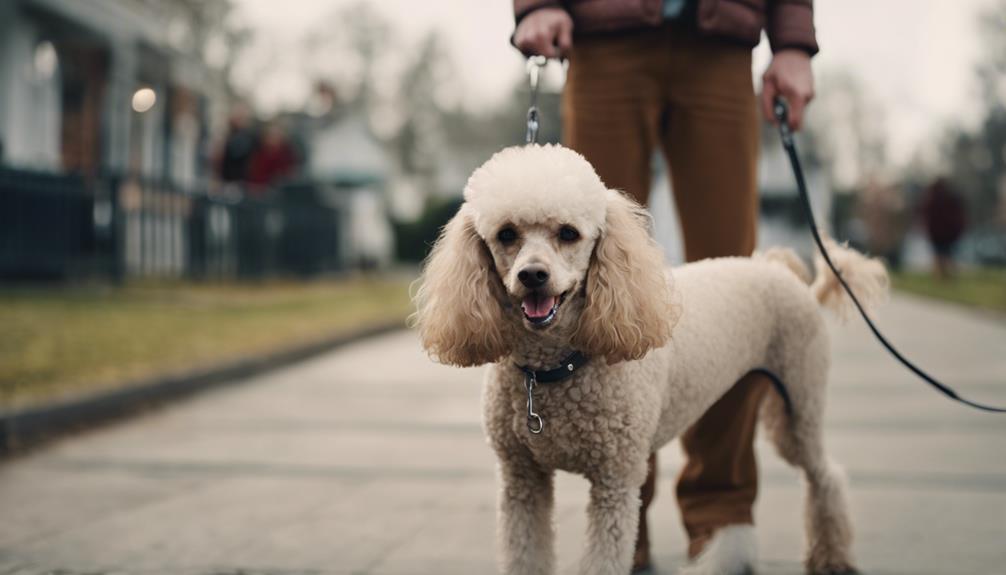
When walking your Poodle, you may encounter challenges like pulling on the leash, distractions during walks, and reactivity to other dogs. These common issues can disrupt your training sessions and hinder progress. Stay focused on addressing these challenges with positive reinforcement techniques and consistent training methods to help your Poodle become a well-behaved and leash-trained companion.
Pulling on Leash
Struggling with your Poodle's pulling behavior on the leash can be effectively addressed through consistent training techniques and the use of appropriate equipment. To help your Poodle walk politely on a leash, consider the following:
- Use a Front-Clip Harness: Opt for a front-clip harness to discourage pulling by redirecting your Poodle back towards you.
- Practice Loose Leash Walking: Encourage loose leash walking by stopping when there is tension and rewarding your Poodle for walking beside you.
- Employ Positive Reinforcement: Reward good behavior with treats or verbal praise to reinforce the desired calm walking behavior.
Distractions During Walks
To improve your Poodle's leash walking behavior amidst distractions, utilize high-value treats or toys to redirect their attention effectively. Training your dog to focus on you during walks can be challenging but rewarding. Consistency is key in helping your Poodle overcome distractions. Practice the 'Look at Me' command to regain focus when your Poodle gets distracted. Gradually expose your Poodle to distractions, starting with low-level stimuli and increasing intensity over time. Incorporate short training sessions specifically targeting distractions to enhance your Poodle's leash walking behavior. Remember, patience is crucial. Below is a guide to help you understand how to handle distractions during walks effectively:
| Distraction Training Tips | ||
|---|---|---|
| Use High-Value Treats | Practice 'Look at Me' | Be Consistent |
| Gradual Exposure | Short Training Sessions | Patience is Key |
Reactivity to Other Dogs
Dealing with your Poodle's reactivity to other dogs during walks requires understanding their triggers and implementing effective training techniques. Here are three strategies to help you manage this challenge:
- Identify Triggers: Pay attention to your Poodle's body language and behavior to pinpoint what specifically triggers their reactivity.
- Desensitization: Gradually expose your dog to other dogs from a safe distance, rewarding calm behavior to help them associate positive experiences with other canines.
- Counter-Conditioning: Encourage your Poodle to focus on you during walks by using treats or toys to redirect their attention when they start to react.
Implementing these techniques can help your dog learn to walk beside you calmly and stop moving backward when encountering other dogs.
Gradual Exposure to Different Environments
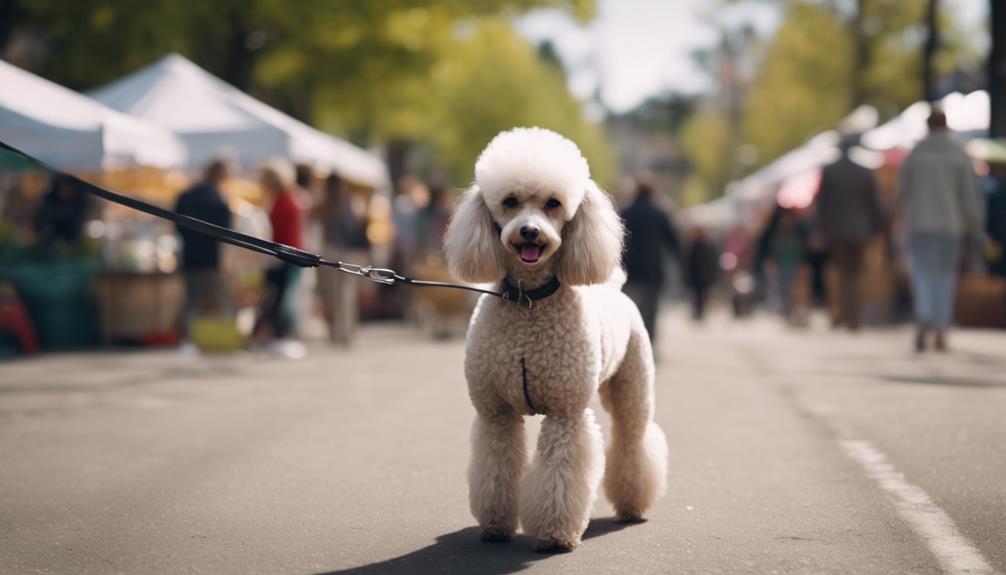
Introduce your Poodle gradually to new environments, starting with familiar and low-distraction settings to build their comfort and confidence. When taking your Poodle to new places, remember to take your time to allow them to adjust. Call your dog's name to get their attention and stop walking if they seem overwhelmed. Apply gentle leash pressure to guide them and provide reassurance. Practice walking in various locations to help your Poodle get accustomed to different surroundings. Below is a table to illustrate how you can gradually expose your Poodle to diverse environments:
| Environment | Approach |
|---|---|
| Familiar park | Begin with short walks and gradually increase the duration. |
| Quiet street | Practice walking past different houses to introduce new sights and smells. |
| Pet-friendly store | Allow your Poodle to explore while on a leash, rewarding calm behavior. |
| Busy sidewalk | Work on focus exercises and reward your Poodle for ignoring distractions. |
| Outdoor cafe | Practice sitting calmly with your Poodle, rewarding relaxed behavior. |
Ensuring Safety During Leash Training
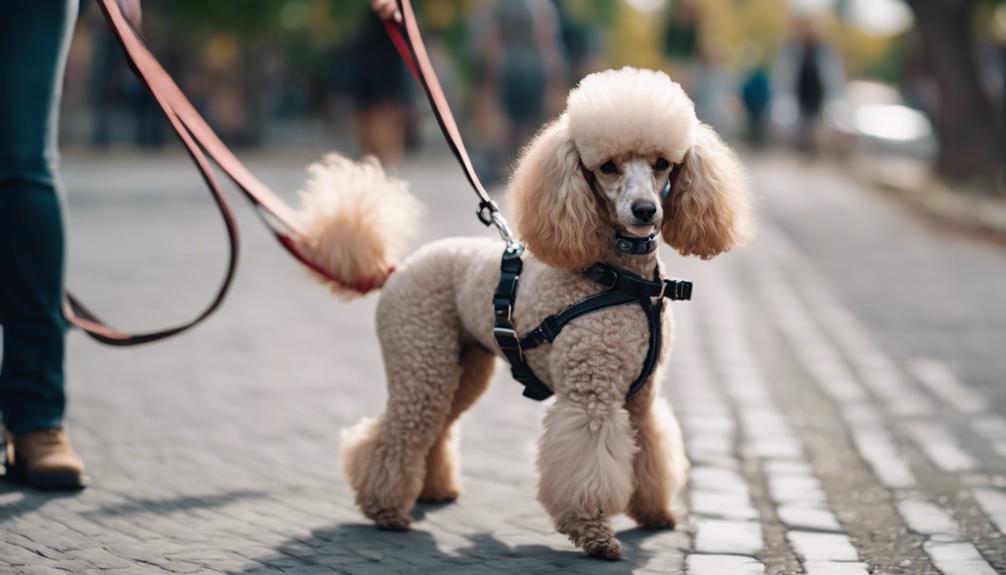
For optimal safety during leash training, ensure you use a properly fitted harness or collar to prevent any potential discomfort or injury. When teaching your dog to walk on a leash, safety should always be a top priority. Here are some key points to keep in mind to ensure a safe and enjoyable training experience:
- Make sure the leash is the appropriate length: Using a leash that is too long can make it challenging to control your Poodle. Opt for a shorter leash to maintain control and keep your furry friend safe.
- Bring your Poodle back to your side: Encourage your dog to walk beside you by gently guiding them back to your side if they start to pull or stray too far. This helps maintain control and prevents them from getting into potentially dangerous situations.
- Keep training sessions short: Poodles have a shorter attention span, so it's essential to keep training sessions brief and engaging. End on a positive note to keep your dog motivated and eager for the next session.
Frequently Asked Questions
How Do You Train a Poodle on a Leash?
To train a Poodle on a leash, focus on positive reinforcement, consistent practice, and patience. Use proper equipment and vary walking routines. Stay persistent, offer treats, and seek professional guidance if needed. Build a strong bond through effective training techniques.
What Is the Fastest Way to Leash Train a Dog?
To leash train your dog quickly, use positive reinforcement, consistent practice, short walks, distraction techniques, a reward system, and patience. By staying committed and rewarding good behavior, you'll see progress faster and build a strong bond.
How Do I Stop My Poodle From Pulling?
To stop your Poodle from pulling, focus on leash manners. Use positive reinforcement, redirect attention, and practice consistently. Keep a loose leash, stay patient, and maintain consistency. Reward good behavior to encourage your Poodle's progress.
What Is the Best Trick to Stop Your Dog Pulling on the Leash?
To stop your dog from pulling on the leash, focus on positive reinforcement, consistent corrections, and distraction techniques. Reward good behavior, gently correct pulling, and redirect attention. Practice loose leash walking, be patient, persistent, and seek help from a professional trainer if needed.
Conclusion
You've learned the key techniques for leash training your poodle effectively. Did you know that studies have shown that leash training can improve your poodle's overall behavior and reduce anxiety? By using positive reinforcement and consistency, you can help your poodle become a well-behaved and happy companion on walks. Keep practicing and soon you'll both enjoy stress-free strolls together!
